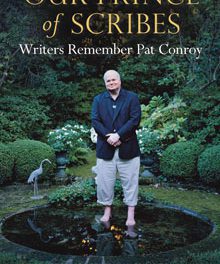 By Margaret Evans, Editor
By Margaret Evans, Editor
The Friday following Good Friday was a very bad Friday for my family.
It started off ho-hum enough, then I got a mid-morning phone call from my sister in Charleston, who’d just had a phone call from my sister in Alabama, saying, “Dad’s collapsed. He’s on his way to the hospital! There’s no pulse and he’s not breathing!”
“Wait. What? No pulse and no breathing?! Are you saying he’s…?”
“No! I don’t know! I’ll call you back! There’s a lot they can do in the ambulance!”
Apparently, there’s only so much they can do in the ambulance when it’s your time. And I already knew before the phone rang seven excruciating minutes later. “Margaret, he died,” my little sister sobbed, and even in that awful moment, I appreciated the bluntness of her words. Not “He passed” or “He’s gone” or “He didn’t make it.” Just “He died.” My dad was dead. For some reason, I needed to hear it like that.
At 80, Dad’s health had been declining for years – he had a couple of mysterious conditions the doctors couldn’t quite get a handle on – but he wasn’t “terminal,” and he seemed much better at Christmas, and with apologies to James Taylor, I always thought I’d see him again.
I’d like to tell you a little bit about my father. He wasn’t the kind of man who makes big headlines, or garners a lot of attention, but his daughter has a column, so he’s about to garner some now.
Born in 1939, Dad was a member of neither the esteemed Greatest Generation nor the world-rocking Baby Boomer Generation. In fact, he was part of something called The Silent Generation (born 1925-1945), a cohort I’d never even heard of… possibly because they’re so silent. He didn’t march with Martin Luther King, Jr., or advocate sticking it to the man, or protest the Vietnam War. (He did serve in the Army as a JAG, but he never saw combat.) By the time Woodstock came along, he was a 30-year-old married man practicing law in my mom’s hometown and raising three daughters, with another one soon to come.
Maybe it’s a Silent Generation thing, but Dad was ridiculously humble. Not only did he never talk about his professional accomplishments – which I’ve recently learned were legion – but I didn’t even know, ‘til I read his obituary, that he was president of his high school student body in Raleigh, NC, president of his fraternity at Davidson College, and a varsity basketball player at Davidson all four years!
He was remarkably patient. He spent most of his adult life with five women and almost never lost his cool. I remember a couple of times he raised his voice – and once even cursed – and they still stand out vividly because they were so rare.
He was quietly, and sometimes deadly, witty. As one of my sisters said last week, you had to be sitting near him to hear his wisecracks, ‘cause they were going to be muttered under his breath, and he sure wasn’t going to repeat them. But man, were they good.
Dad was sentimental in the best sense of that word. Movies and music could make him cry, along with most things patriotic. He could get a little sappy about the United States of America, and he still got excited about fireworks.
He loved music, and he taught us to love it, too. Classical, choral, show tunes, pop, and occasionally, country. Thanks to Dad, there was almost always music playing in our house – often quite loudly. He loved to sing, and often did so. Loudly. He brought a karaoke machine into our home one Christmas before anybody had ever heard of such a thing. We called it the “singing machine” and it played 8-track tapes. Cheesy ones. (Dad could often be heard brushing up on his Lionel Richie or Kenny Rogers when he wasn’t practicing Handel’s Messiah or some such for his choir at the Methodist church.) Unlike many “manly men” – which he certainly was – Dad was a musical theater buff and performed in several local productions over the years. He was FDR in ‘Annie,’ John Hancock in ‘1776,’ Colonel Pickering in ‘My Fair Lady,’ just to name a few…
Despite his musical flights of fancy, this otherwise calm, quiet man was the epitome of steady. He gave his children a sense of security and routine, along with the absolute knowledge that we were loved and supported. He went to work in a tie, with a brief case, every day of the week . . . grilled burgers on Friday night . . . cut the grass on Saturday afternoon . . . took us to church on Sunday morning . . . and played tennis, read biographies, and worked crossword puzzles if there was any time left over. He openly adored our mom and thought she was the most beautiful woman in the world. Except for maybe Grace Kelly. Dad loved Grace Kelly.
He practiced the kind of law they call “civil.” It’s not flashy. He helped people with their wills and contracts and personal disputes, while also representing the County and the local Board of Education for decades. An associate from Birmingham, upon hearing of Dad’s death, wrote to one of his law partners, my brother-in-law:
“Bill was a ‘lawyer’s lawyer.’ He combined a staunch commitment to legal scholarship and vigorous advocacy with civility and uncompromising professionalism. His leadership and gravitas helped establish education law as a bona fide practice specialty in Alabama and ‘upped the game’ of all who had the pleasure of knowing and working with him. Bill was nobody’s wallflower, but wasn’t one to put the spotlight on himself. Looking back on his distinguished career and many contributions to our calling, it occurs to me that he may not have received the full measure of recognition along the way that he deserved. His rich legacy and the example he set for those that follow in his large footsteps will nonetheless be a positive and enduring one, and will benefit the cause of public education for many years to come.”
I cried when I read that. I also giggled a little, because Dad wore a size 13 shoe. Large footsteps, indeed.
He was smart – really smart – but he mostly used his smarts to serve his community, through his lawyering and his work with various civic organizations. He never wrote a bestseller or developed a new philosophy or tried to change the world through politics. He just did his duty, upheld his civic responsibilities, and treated everybody in his radius with dignity, respect, and kindness. He did right by his fellow man. And woman.
I think my dad’s the reason I’ve had such a hard time fully embracing the #MeToo movement, and even feminism in its current manifestation. It’s hard to believe in the widespread scourge of toxic masculinity when you’ve been raised by such a man. It’s difficult to care much about smashing the patriarchy when your own patriarch has been so gentle, encouraging, wise and good.
At the visitation, a couple of people told us, through their tears, that Dad had always been their real-life Atticus Finch. I’d heard it before, and I’ll never tire of hearing it, even now that Atticus has fallen out of favor in certain circles. I suppose some folks might look at my dad and see nothing but an example of “privilege.” And I’d have to tell them about his dad – my grandfather, “Dabba” – who came from a poor family of eleven children and literally had to walk miles in the snow to his one-room schoolhouse. Despite those circumstances, Dabba managed to turn himself into a professor of textile technology at NC State in Raleigh, where he invented the first synthetic aorta and built guitars in his backyard workshop for fun. His boy Bill went to Davidson College on a basketball scholarship, then to law school at Chapel Hill, where he excelled, and it must have made Dabba so proud.
Dad had only been retired a little over a year, and only then because of his health. His quality of life had steeply declined. This once strong, athletic man, who stood an elegant 6 feet, four inches tall, could no longer take his boat out on the river, or work in his garden, or drive to the office, or even pull the trash out to the curb. But he still had his music and his books, his crossword puzzles and his football. Dad loved Alabama football with the white-hot intensity of a thousand suns.
Our daughter is going to Clemson next year, so maybe his passing was a timely gift from God.
RIP, Dad. Thanks for everything.






